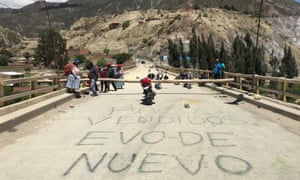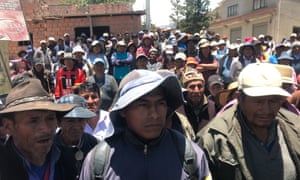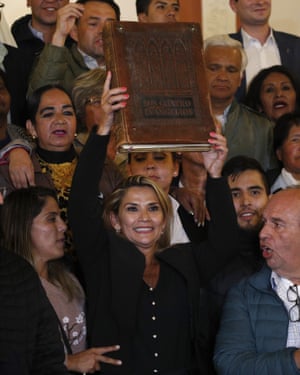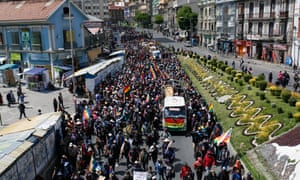Followers of the exiled ex-president hope their blockade of food and fuel will bring concessions from the new rightwing government

The barricades blocking the road to Alto Lipari are fashioned from every conceivable object: telegraph poles and tree trunks, wheelie bins and wooden crates, a bed frame and even a shipping container daubed with insults aimed at Bolivia’s “sell-out” police. Their message is unambiguous. “Evo de nuevo” reads a demand written on to the ground at the blockaded entrance to this rural farming community an hour’s drive south of La Paz. “Bring Evo back.”
A 20-minute hike further on, a group of Evo Morales loyalists, armed with sticks of dynamite used to deter unwanted visitors, keep watch from a mountainside observation point.
“We are organised, and if they bother us we will respond – nothing more,” said Javier Mamani, 52.
Nearly two weeks after Bolivia’s first indigenous president was forced from power, his followers are mobilising in places such as this arid, high-altitude settlement in a bid to pile pressure on the country’s new rightwing government. Their plan – which many believe has been plotted by Morales from exile in Mexico – involves using hundreds of roadblocks to prevent fuel and food reaching Bolivia’s de facto capital and thus force concessions – perhaps even Morales’s return.
“If they don’t comply [with our demands], not a single product will reach the city of La Paz. I’m really sorry but this is the decision,” said Martin Cornejo, a local organiser in the tomato and cucumber growing region called Río Abajo that includes Alto Lipari. “The people will not rest until Evo Morales Ayma returns.”
As he spoke, hundreds of locals gathered to denounce, often in screams and shouts, the new government they blame for toppling a revered leader who put Bolivia’s long-excluded indigenous communities on the map during almost 14 years in power.“They think we are from a different country. But we are originarios [natives]!” fumed Miguel Aguilar, a 60-year-old farmer.

“We are going to fight!” vowed Johny Quisbert, 40. “They treat us like Indians!”
Rosa Maita Illanes said locals were horrified by the deadly violence inflicted on Morales’s indigenous supporters since he fled the country on 11 November after allegations of electoral fraud. They wanted the immediate resignation of Bolivia’s interim president, Jeanine Áñez, she said. “We are here [to get rid of] this lady dictator,”
the 50-year-old woman said.
Cornejo said this was “the desire of all the people of Bolivia”, but for all the indignation on show in Alto Lipari, that last claim is flawed. Many Bolivians from across the political spectrum cheered the downfall of a leftwing populist who, for all the economic and social progress he brought, seemed set against relinquishing power and was criticised for his increasingly authoritarian bent.
Bolivia’s new government – and some residents of the blockaded communities themselves – consider the pro-Morales protesters dangerous agitators bent on plunging the South American country into chaos in order to secure their figurehead’s return. On Friday, Bolivia’s new interior minister publicly accused Morales of terrorism and sedition for his alleged role in directing the protests.
“People are afraid,” one local man complained of the pro-Morales activists now controlling the streets of Alto Lipari and the surrounding area.
Nearby someone had chalked their feelings on to the rubble-strewn road. “Evo Culo,” it said. “Arsehole Evo.”
Desperate locals last week attempted to highlight their plight in a social media plea that read: “We are hostages in our own homes! Help!”
Rafael Quispe, a rightwing indigenous congressman who supports Bolivia’s interim leader, said he believed it was time for the government to declare a state of siege in areas where supporters of Morales’s Movimiento al Socialismo (Movement Towards Socialism) were rising up. “Evo Morales is inciting terrorism,” claimed Quispe, who hails from El Alto, a longtime bastion of Morales support near La Paz where the opposition mayor’s home was recently torched by a pro-Morales mob.

The escalating rhetoric and violence – which has so far claimed at least 32 lives – has left Bolivia on edge and moderate observers uneasy about the coming days. “You have a moment at which you have two very fanatical factions at the extremes that are willing to do almost anything to seize power or hold it,” said Jim Shultz, founder of the Bolivia-based Democracy Centre and a longtime observer of the country’s politics. “And you have a whole lot of people in the middle who just want fair elections, democracy and peace and want to move along with their lives.”
Efforts to calm the situation have been undermined by a spate of killings by security forces and missteps from Bolivia’s caretaker president, a conservative Catholic who has posted racist Twitter messages disparaging indigenous Bolivians, and who initially failed to include a single representative of the country’s indigenous majority in her cabinet. Áñez fuelled tensions with her decision to declare herself interim president while clutching an over-sized Bible.
Perhaps most damaging of all was the desecration of the indigenous Wiphala flag by security forces in the days following Morales’s flight, a profoundly insulting gesture.
At one barricade in the village of Jupapina a sign has been daubed with the words: “Respect the Wiphala, carajo!”
“It is sacred and they did not respect it,” said Victoria Ali Quispe, a 35-year-old streethawker who was selling sweets beside the blockade. “They trampled on our flag.”
In recent days, Áñez has sought to counter the perception that her almost entirely white administration is a foe of Bolivia’s indigenous peoples. “We are a government of peace and that is why I am asking for us to unite and reconcile so that together we can build the Bolivia we are all fighting for,” she said in an address to her divided nation on Thursday, before signing off with the words: “May God bless Bolivia.”
But Morales devotees are unconvinced by such declarations.
“Our plurinational state has suffered a coup d’état led by racist and fascist people,” said Cornejo, the Alto Lipari organiser. “And the armed forces have turned their backs on the Bolivian people to support these rightwing fascist coup-mongers.”

On Thursday, as thousands of demonstrators marched on central La Paz to protest about the killings of eight men in the city of El Alto, security forces greeted them with armoured vehicles, a barrage of tear gas, and chased marchers, including many elderly women, through the streets on motorbikes.
“They talk about the Bible but in which chapter does it say you should kill the people?” asked Felix Mamani, a 65-year-old retiree who had joined the march. “In the past, they enslaved us [with the Bible] and now they want to use the same weapon to enslave us again.”
In the surrounding alleyways, racially charged arguments broke out between the largely indigenous marchers and other locals who back the new administration or were simply suspected of doing so, because they were of European descent.
“Go back to Spain!” one elderly lady snapped at another woman as tempers flared.
There was a glimmer of hope for a peaceful solution last Friday as authorities said some pro-Morales activists had agreed to dismantle their roadblocks, with negotiations aimed at paving the way for fresh elections appearing to advance.
But Shultz said he feared what such divisions meant for Bolivia’s future.
“This is by far the most dangerous moment in the 30 years I’ve been associated with the country, that’s for sure,” he said. “All the conflicts up until now have basically been mobilisations of the people against the government. This is pueblo on pueblo and it is a whole different thing.”
Additional reporting Cindy Jimenez Becerra

Comments
“As he spoke, hundreds of locals gathered to denounce, often in screams and shouts, the new government they blame for toppling a revered leader who put Bolivia’s long-excluded indigenous communities on the map during almost 14 years in power.“They think we are from a different country. But we are originarios [natives]!” fumed Miguel Aguilar, a 60-year-old farmer.”
You know what’s dejavu? I think I wrote a comment a while ago that my friend from Canada was treated the same way and even accused of imitating “Jamaican accent” when he talked to white girls.
White bigots believe that the continent of South America belongs only to them (whites). They praise Argentina for being white, despite Buenos Aires being a total s-hole ghetto, while hating on Venezuela because of Chavez and the Afro-Latino struggle.
Regarding how whites view Guyanese, Surinamese and my brethren in french Guiana; the whites wish that we all just disappear so that they can live in their first world utopia.